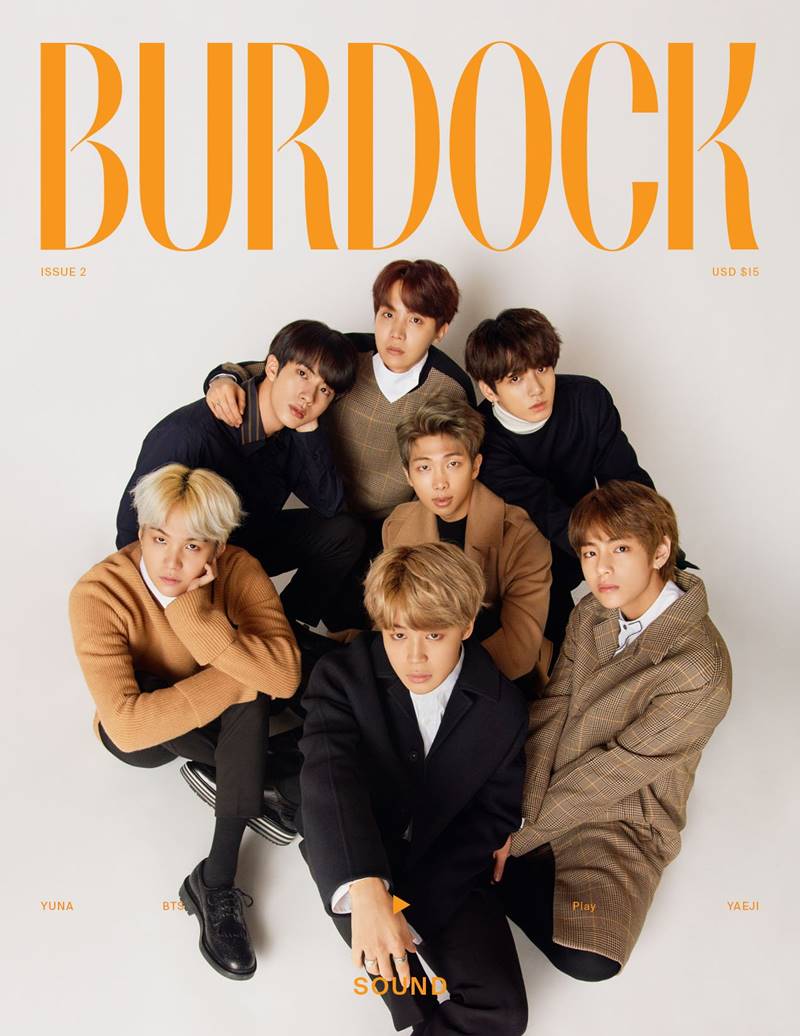
Words by Jae-Ha Kim
Photos by Peter Ash Lee
Burdock Magazine
July 8, 2021
Several years ago, I received an email from BTS’ team. Would I please interview them and write an article — for my blog. This was before the Korean septet won their first Billboard Music Award for Best Social Artist… before they graced the cover of TIME magazine… before they performed at the Grammys… before they became the first group since the Beatles to have three No. 1 albums on the Billboard 200 chart in less than 11 months… before they sold out football stadiums worldwide (including Wembley)… before their all-English single “Dynamite” topped Billboard’s Hot 100 (followed quickly by another No. 1 hit in “Savage Love (Laxed – Siren Beat) (BTS remix),” their collaboration with Jawsh 685 and Jason Derulo)… and before the Korea Society honored them with the Van Fleet Award, which is awarded to distinguished people who have made outstanding contributions to promoting the U.S.-Korea relations.
This request came about a month before their career trajectory catapulted them into the rare stratosphere of superstars whose every move is scrutinized. This was a few months before they got so famous that their publicity team would switch gears from trying to drum up interest in the group to politely turning down all but a handful of select interviews for each comeback.
BTS is the first Korean group to achieve this kind of sustained international acclaim. They have become not only the biggest boy band, but one of the most famous music acts in the world. Period.
BTS’ MAP OF THE SOUL : 7 became the best-selling album of 2020. It also earned the distinction of being the first album to have sold more than 500,000 copies in the U.S. alone (and five million copies worldwide) in the first half of 2020. Minutes after the video for their anthemic single “ON” was released, it became the biggest YouTube premiere until that time, with 1.54 million concurrent viewers tuning in to watch the video. BTS topped their own record last August, with the disco pop hit single “Dynamite.” The accompanying music video was seen by more than 3 million concurrent viewers. [As we went to press, their 2021 single “Butter” had yet to be released.]
During this coronavirus pandemic — which has prevented bands from touring and left many people in a funk — BTS could’ve used that time to take a well-deserved rest from work. But that’s not their style. Instead, they put together a second album: BE – Deluxe Edition. It was recorded to showcase the seven members’ collective unity not only as singers and rappers, but as songwriters and producers. Kim Nam-Joon (RM), Kim Seok-Jin (Jin), Min Yoon-Gi (Suga), Jung Ho-Seok (J-Hope), Park Ji-Min (Jimin), Kim Tae-Hyung (V) and Jeon Jung-Kook (Jungkook) were actively involved in the creative process of the album, from beginning to end.
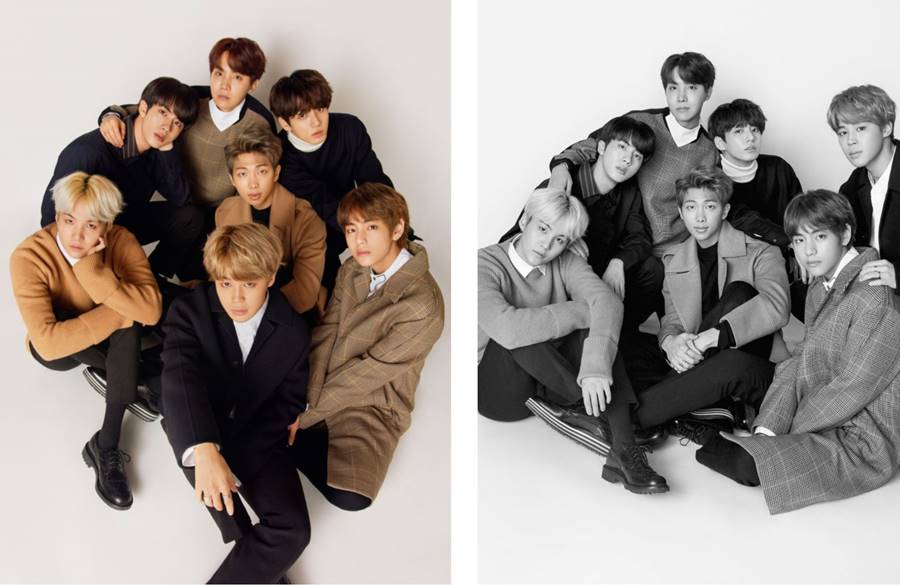
It’s almost pointless to list all their accomplishments, because by the time this issue hits newsstands, BTS will have sold more albums, broken more records and gotten exponentially more famous. At this point, they are their own biggest competition. And each time they eclipse their previous achievements, they draw attention not only to themselves, but also to the best that South Korea has to offer. Theirs is the kind of success story that makes Koreans worldwide weep with pride and joy.
Korean American photographer Rachel Lesiw said that she grew up in a predominantly white area without ever realizing how important it was to see herself represented in the media. It never occurred to her that any Asian celebrities would be featured on the covers of magazines or on television, because she hadn’t experienced it in her own childhood. Based out of Northern California, Lesiw said she’s grateful that it’s different for her three children.
“One of my favorite things is to watch awards shows where BTS perform,” said Lesiw. “It’s not just their performances that I like. It’s hearing the crowds go absolutely insane cheering for them. After BTS appeared for the first time on ‘The Tonight Show Starring Jimmy Fallon,’ Questlove was in awe of them and their fans. He didn’t think that kind of following existed anymore, but it turns out it does. And BTS has them.”
Anyone who has attended a BTS concert understands this symbiotic relationship that BTS has with their fandom, ARMY. This love affair between artists and fans is based on mutual respect and trust. The Hunger Games-like experience of trying to snare a ticket to their shows is all but forgotten when the members hit the stage. It’s not only the performances that are mesmerizing, but the ments — or comments — that they make between songs, where they share their hopes, dreams and also some of the hardships they endured to get to perform for their fans. As for ARMY, they are a beautiful array of diversity, unfettered by race, gender, religious beliefs or language restrictions.
Even during a pandemic that has crippled the music industry, the group’s members have taken it all in stride. With their worldwide stadium tour postponed, they hosted Bang Bang Con — a free two-day series of concerts from previous tours — followed by a pay-per-view live concert dubbed Bang Bang Con The Live, which was recognized by the Guinness World Records for being the most watched music concert live stream in history. In October, they followed that concert with Map of the Soul ON:E, beating out their previous achievement with nearly one million tickets sold and viewers from 191 countries and regions around the world.
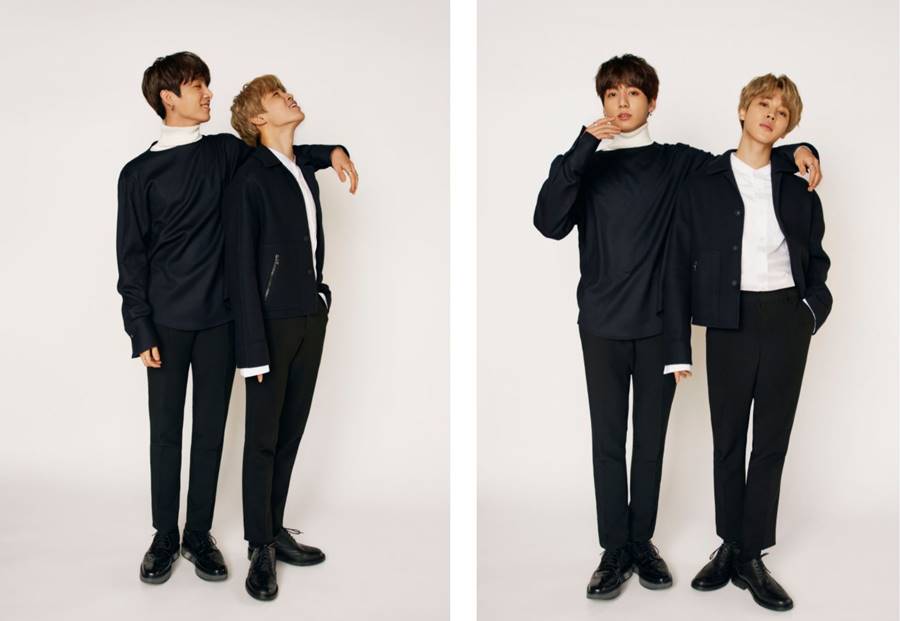
“This is their time,” said Japanese American DJ and producer Steve Aoki, who worked with BTS on a trilogy of songs (“MIC Drop (remix),” “Waste It on Me,” “The Truth Untold”). “They are such wonderful guys and amazing artists. They work so hard and I love seeing all the success they are having. It couldn’t happen to nicer guys, who I consider to be my little brothers.”
Aoki praised BTS not only for their music, but for what their success represents. They proved that a group singing almost exclusively in Korean was marketable not only in Asian countries, but in the United States. This sentiment is echoed by South Korean academic Dr. Jeeheng Lee, who authored the book, “BTS & ARMY Culture.”
“Before BTS, K-pop had great success in Asia and South America,” said Dr. Lee, who teaches at Seoul’s Chung-Ang University. “But it was primarily considered something for the Asian market. Groups have tried to make it in the United States, but they lacked mainstream appeal. The U.S. holds the hegemony of the global music industry and breaking into that market is elusive for any act, much less one that doesn’t share the language. The success of BTS in the West undeniably broadens the horizon of K-pop’s worldwide appeal. Modern music from the United Kingdom was once referred to as the British Invasion in the U.S. market. But as it gradually began to gain universal popularity, they were identified by its artists and not with a modifier containing nationality. As a non-English act, the road for BTS has been much harder than that of U.K. artists, but I believe the day will come when BTS will be just BTS, and not need the qualifier of Korean or K-pop.”
She likens BTS’ achievements to the unprecedented success of the feature film “Parasite,” which won four Oscars at last year’s Academy Awards. Yes, the accolades bring attention to Korean artists. But they also are a great source of pride for Koreans worldwide.
“What matters now isn’t the West’s approval, but that Korean people finally realize that Korean culture isn’t secondary to Western culture,” said Dr. Lee. “Koreans need to free themselves of this mindset of imperialistic inferiority. BTS is helping in that regard.”
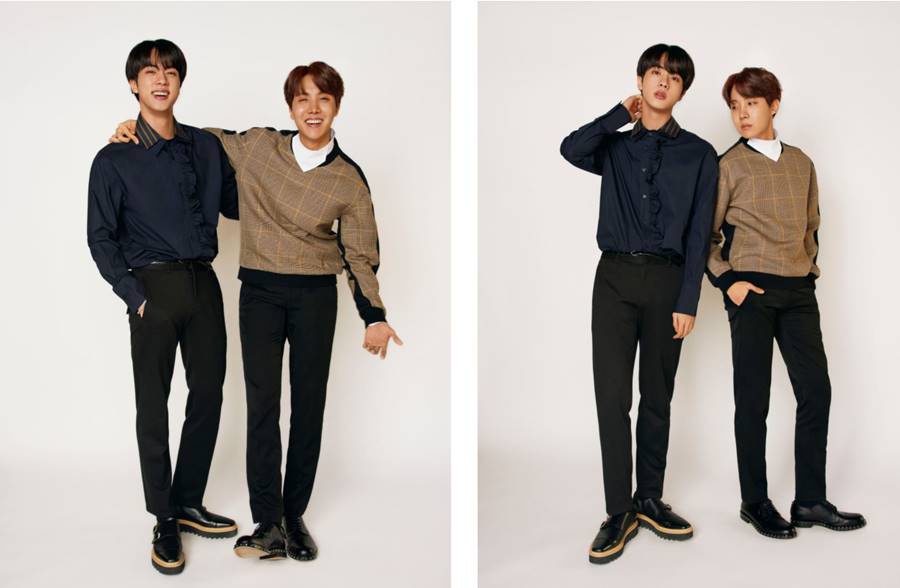
It’s undeniable that BTS is a dynamic group that knows how to present exhilarating performances punctuated by perfect dance moves. But without their songs, the performances would be meaningless. Their music is decidedly modern, blending hip hop, trap and lush vocals without dissonance. And then there’s their lyrics. Whether they’re spitting out diatribes against society’s expectations or singing a soothing ode to a lost friend, they have the ability to turn the ordinary into something extraordinary.
Their global reach and uplifting message of empowerment is such that they’re not only in demand to appear on entertainment programs or awards shows, but in events attended by worldwide leaders. They spoke at YouTube’s “Dear Class of 2020” virtual graduation, which also included former U.S. President Barack Obama, Michelle Obama and Nobel Peace Prize recipient Malala Yousafzai.
As global role models whose work with the United Nations Children’s Fund (UNICEF) has been lauded, BTS consistently have shown support for relevant issues. But throughout it all, they’ve stressed that caring about your own well being should never be relegated to an afterthought. Some naysayers wrote this off as pretty boys being precious. But if you yourself are struggling to survive, how effective can you be in helping others?
This message of self love and self care is something that RM reinforced at the 2018 launch of Generation Unlimited, when he spoke before the United Nations General Assembly. (The whole group would speak from Seoul in 2020, during the UN’s virtual assembly.) During his speech, he said, “Maybe I made a mistake yesterday, but yesterday’s me is still me. Today, I am who I am with all of my faults and my mistakes. Tomorrow I might be a tiny bit wiser and that’d me, too. These faults and mistakes are what I am, making up the brightest stars in the constellation of my life. I have come to love myself for who I am, for who I was and for who I hope to become. … No matter who are you, where you’re from, your skin color, your gender identity — Just speak yourself.”
Just as there was British music before the Beatles, of course there was Korean pop music before BTS. But by achieving this kind of worldwide fame, BTS’ success has been a game changer. The general public may profess that they don’t know what Korean music sounds like, but they know who BTS is. And for Asian Americans who grew up seeing themselves represented in Western media only as martial artists, dry cleaners or nail technicians, it’s eye-opening seeing a group of young Korean men who are visibly at the top of their game and in charge of creating their own destiny.
“Many Asians overseas are still living as second-class, sometimes invisible citizens,” said Dr. Lee. “For diaspora Asians to prove that they are unique and special, they have to make several times more effort than the dominant white people. While Asian people’s individuality may be revealed in the relationships they encounter face-to-face in everyday life, the stereotype of ethnic minorities plays a very important role in social perception. That’s why a successful representation is pivotal. BTS are accepted as cool, natural and charming and that plays an important role in breaking the social stereotype of Asians. This is why so many Asians living in the West are so proud of them.”
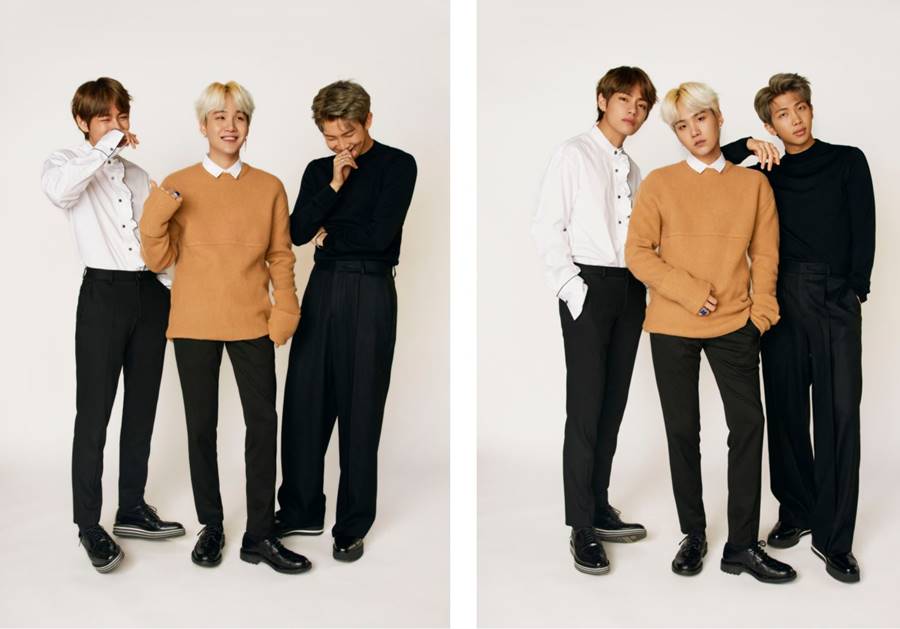
For some Korean diaspora, BTS is what connected them to their Korean culture. Diana Otwell was born in Seoul and was just five months old when her family immigrated to the U.S.
“I grew up always trying to fit in with my American friends,” said Otwell, who resides in Jacksonville, Florida. “I just turned 50 and never really embraced my Korean heritage. I never had any Korean friends. I was always embarrassed and tried to run away from who I am. I found BTS a few months ago after watching them on ‘Carpool Karaoke’ (a recurring segment on ‘The Late Late Show with James Corden’) and just got sucked in. It took seven humble, courageous and resilient young men to teach me that I should be proud to be Korean. As a result, I’ve started to learn Korean and want to take my family to Korea after my youngest graduates from high school.”
Melissa Lindemann said that it wasn’t until she started paying attention to BTS that she delved into her Korean heritage. Adopted from South Korea as a baby, she grew up in Minneapolis to German and Norwegian parents and withstood bullying from classmates who taunted her for being Asian.
“I turned around and yelled, ‘I’m not Chinese or Japanese. I’m Korean!’” she said. “Of course, I really had no idea what being Korean even meant. But when I saw BTS perform on the ‘American Music Awards,’ it finally hit me and I teared up. I realized that I had been ignoring this part of me for too long. I felt guilty, sad, moved and happy. How ironic was it to finally see my roots so widely embraced by American culture, before I had embraced it myself?”
What Lindemann felt for BTS was jung, a distinctly Korean word that encapsulates a feeling of closeness and kinship. This feeling often arises when Koreans encounter each other far away from home.
At their UN speech this past September, BTS talked about overcoming the difficulties brought on by this pandemic. They also left a hint about what would become a central element of “BE.” After they had finished their individual speeches, each member repeated the phrase, “Life goes on.” Their final words were spoken in unison: “Let’s live on.”
It’s no coincidence that “Life Goes On” is the title they chose as the debut single from “BE.”
BTS’ platform speaks to having a strong sense of self. As the years have gone by, it’s become clear that the cerebral aspect of their music isn’t something that was recently cultivated. Even as a fledgling group that was trying to distinguish itself from all the other bands debuting in 2013, they had a plan. The psychological concept behind their music, the names of their albums and even the storylines behind their beautifully-crafted music videos have been meticulously worked on for years. They approach their music as art, because that’s what they want to create – something beautiful and meaningful that withstands the test of time.
(Editor’s note: As Burdock went to press, we were saddened to learn of Ms. Lindemann’s passing.)
See the full cover story in Burdock’s Sound issue.


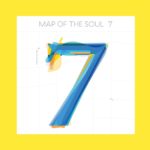



3. Since I was a little kid, my dad had worked on providing a Korean news paper to the community in FL and poured his money and endless hours in to it. Mad respect!
4.
@GoAwayWithJae has become one of my favs to follow on Twit
Look what arrived today! I can’t wait to read it. I love the feel of this magazine. It reminds me of a notebook I had that was made from recycled paper. The pages were so smooth and pleasant to the touch. Thank you @GoAwayWithJae and @burdockmedia
just got my bts burdock magazine and their essay is so beautiful! thank you so much for sharing their successes and the impact their careers have had! such a beautiful cover too White heart
I’ve waited for this article to come out for a long time. Adoptees are often told to be grateful or overlooked completely. While BTS hasn’t addressed adoptees or the deplorable way South Korea treats adoption, I am still happy to see them representing the country I was born in. It’s complicated to feel love for a country that kicked me out because I was born to an unwed mother, but I feel pride rather than shame for being Korean. That’s a start. Thank you, Ms. Kim, for everything that you do.
Guess who forgot she pre- ordered a copy of Burdock Magazine issue 2 featuring BTS? You guessed it, me! I was pleasantly surprised when I checked the mail. I enjoyed reading the magazine. Ty Burdock Media and @GoAwayWithJae for the wonderful @BTS_twt article.
I always appreciate your words! Wonderful job and I look forward to reading the other features and supporting them in the future
TODAY I recd Burdock Magazine with BTS as their main story. There is an article saying many Korean immigrate to overseas or being adopted and forget their roots after listening and stanning BTS they accept their korean root and proud of it even they live for a long time at western world they are neither being accepted due to being Asians even adopted by white families and suffer abuse at schools bc of racism. But after knowing BTS it’s heals their soil n accepted who they are. Many are saying bc of BTS being acknowledge n awe to western world so ASIANs in western world become accepted n acknowledged. And being respected and look up upon. So BTS nit only bring fame n glory to S KR but BTS pull up whole yellow skin poc everywhere outside asian BTS becoming like Asians countries ambassador that open up a world where by western counterpart need to salute and acknowledge n pat respect. Plus BTS can achieve so much even though understand able as citizen need obey country law n we no right to say
Thank you @GoAwayWithJae & Burdock Magazine – Peter & Hannah – for letting me be a part of your Sound Issue. Jae – this is such a well written article about @BTS_twt and it makes me so proud to be #BTSARMY💜
Thank you and bravo @GoAwayWithJae for such a wonderful and well-written article on the 7 wonders of @BTS_twt
Thank you Burdock Magazine for the great Sound issue
Yay! My issue of Burdock came in. Lovely article about the impact of BTS on Korean diaspora accompanied by some nice photos. I only wish the postman hadn’t bent it the wrong way while shoving it into my mailbox.
Thank you so much for this beautiful essay, Jae. I am only part Asian, but as a minority I understand some of the things the people you quoted went through. I would like to thank them for sharing their stories and also thank you very much for continuing to support POC.
Yeah, it came! I wonder how long it will take me to open. I have no idea why but I have this need to keep them safe whatever packaging.
Burdock has arrived, here’s my collection so far, including RS US/Korea/Japan! Appreciate the handwritten personal note from Burdock, saving that inside the magazine
@BTS_twt
Came home from a slightly hectic vacation to find my Burdock magazine waiting for me! Can’t wait to read it. Thanks for the essay
@GoAwayWithJae
– it might end up being my vacation from my vacation 🤣💜
Thank you for this beautifully written article. The photos are phenomenal too.
My resistance to becoming Army was partly wrapped in my own fears & hurts from being mocked & trying to assimilate into American culture. BTS’s freedom from that specific type of self-consciousness, and their devotion to their craft and Army, were healing I didn’t know I needed.
Thank you so much for your article about BTS on Burdock. I’ve read a lot about them in the past few months but I’ve never read something that touched me as much as yours. I’ve lived 40 years without so much interest in music (when I said that to friends they would just look at me and think I’m soul-less haha) and this year I discovered BTS and that changed. Reading your article and the stories about other Asian Americans I identify myself completely.
I was born and raised in Brazil, Japanese immigrant grandparents, almost no Asian friends around. As an adult, I’ve lived in Asia (mainland China) for 3 years, and I’ve visited many Asian countries, including South Korea and Japan. I’ve written extensively about my experiences and feelings about my Asian heritage, living in the west and east, fitting in, not fitting in wherecer I go. Then, all of a sudden, living in the US, in a pandemic, I found myself really understanding that it’s more than just the music, the dancing, the aesthetics of BTS that really got me, it’s about representation. It’s about seeing someone like myself on a TV (I barely watched anything on tv for the last 20 years, I thought that didn’t matter to me). I can’t stop myself from thinking that my kid will have what I didn’t and that I must keep BTS and other Asians on mainstream media for her and for all the other kids around because representation really matters.
Anyways, what a long email! Thank you, keep writing and I’ll keep reading what you write.
I wept. Just a beautiful essay, Ms. Jae. Thank you for writing this and giving the perspective that many of us Asians feel.
This is such an important piece. Thank you for writing this. ARMYS love it. Thank you thank you!
I bought the print version of this and am sharing this online version with my family members and friends who don’t understand why I at 34 am so enthralled with this group of men. The quotes from the adoptees reflect my own “awakening” I guess of my culture. I had tried to become as American as I could but no one accepted me as anything but a foreigner.
Thank you for all the work that you do. I have your Teen Vogue oped pieces and pieces about adoption pinned. Thank you for being such a strong ally to our community.
Such a gorgeous essay. Thank you, Ms. Kim. You get us. You really do.
I was disappointed but not surprised that haters and antis are sitting underneath this beautiful article spreading all kinds of ridiculous lies about you. This is not what BTS would want. Shameful really.
?? What’s going on?? How could anyone hate this article? It’s a love letter to the group and how much they mean to Asian diaspora. Who could hate that?
Ridiculous haters like this person (@ / @lavendersun_art) saying this: “Friendly reminder this journo is a HUGE anti who lied about fans not being allowed to interview bts, threw a fit bc she did not get the esquire piece, is friends w tamarindo and jeff, and promoted a solo bar project (and never disclosed whether she received money for it)”
Original tweet is here https://twitter.com/lavendersun_art/status/1475981856394727424 but I copied the text because she’ll prob delete her tweet if anyone calls her on it.
And it’s a pet peeve of mine when people try to get cute with their tweets. There was nothing friendly about her “reminder.” She wants nothing more than to see other people attack a Korean woman who has done nothing but uplift her community and look out for other marginalized groups.
Jae is an ally. Haters like the one you’re talking about are trouble makers who don’t care about Koreans. They are like all the other racists who don’t want us living in “their” country.
I don’t know what an anti is. I also don’t know who Tamarindo and Jeff are. I don’t know what a solo bar project is either. I do know that the person making all these wild claims sounds unhinged. It’s a shame that sad women like her try to take down other women for being good at what they do.
This article was amazing. I am not a BTS fan and I don’t particularly like their music. But this article made me see why they are so relevant to Asian Americans. Great job again, Jae. Keep up the great work!
Look at the misogynist language this witch uses. Jae did not throw a fit about anything. Even when delusional people are saying the most horrid things about her and to her, she either ignores them or puts them in their place. I’ve followed her work since before there was a Twitter and she handled haters in the same way. She ignored most of them and lived her best life. I wish these LOSERS would do the same.
But Jae had so much praise for the Esquire article and the writer. She said it was one of the best things she’d ever read on the boys. I think she tweeted about that several times too. I mean just because that person is spreading lies doesn’t mean any of it is true. Sadly people like her have other idiots who are liars too and follow along blindly without doing any crititical thinking of any kind. Jealousy knows no bound I suppose.
lmao She is a troublemaker and blocks everyone who tries to reason with her. None of what she says is true. She posts some screenshots as proof to suit her needs. @lavendersun_art is a sad troll who needs to get a life. Why doesn’t she tag the group in all of this? She hates successful women who have access to all the oppars that would recoil from her. Sad.
Thank you Ana. I already had that person blocked so I didn’t see any of her drama.
It’s hard to explain but this article got in all the facts while also feeling very intimate. Thank you for this Jae-Ha. I read this with my morning coffee and teared up a few times. I am 42 this year and never felt welcomed in the U.S., even though it is my home. I found BTS at the right time and feel less lonely.
I cried. Thank you for writing what was in my heart.
I loved this entire essay, but the ending was chef’s kiss superb! “BTS’ platform speaks to having a strong sense of self. As the years have gone by, it’s become clear that the cerebral aspect of their music isn’t something that was recently cultivated. Even as a fledgling group that was trying to distinguish itself from all the other bands debuting in 2013, they had a plan. The psychological concept behind their music, the names of their albums and even the storylines behind their beautifully-crafted music videos have been meticulously worked on for years. They approach their music as art, because that’s what they want to create – something beautiful and meaningful that withstands the test of time.”
As a Korean adoptee, I wanted to thank you Jae for this beautiful piece. That it ran in a format run by Korean American artists makes it even better. I didn’t feel much of a connection to Korea until I started listening to BTS. Growing up in a white family in a white community, I never saw myself represented. BTS represents me and I couldn’t be prouder. You captured all my feelings about them in one article. Thank you again from the bottom of my heart.
This is the article I needed to read. I didn’t have enough money to order the magazine this summer. I’m so thankful Burdock made this accessible to all of us. Thank you Burdock and thank you Jae-Ha Kim! And most of all thank you BTS!